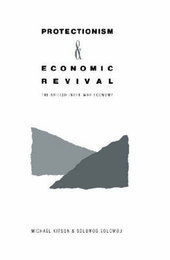
|
Protectionism and Economic Revival: The British Inter-war Economy
Hardback
Main Details
| Title |
Protectionism and Economic Revival: The British Inter-war Economy
|
| Authors and Contributors |
By (author) Michael Kitson
|
|
By (author) Solomos Solomou
|
| Physical Properties |
| Format:Hardback | | Pages:136 | | Dimensions(mm): Height 228,Width 152 |
|
| Category/Genre | Economic history |
|---|
| ISBN/Barcode |
9780521382670
|
| Classifications | Dewey:382.73094109043 |
|---|
| Audience | | Professional & Vocational | |
|---|
|
Publishing Details |
| Publisher |
Cambridge University Press
|
| Imprint |
Cambridge University Press
|
| Publication Date |
28 September 1990 |
| Publication Country |
United Kingdom
|
Description
The impact of protectionism is currently a contentious policy issue. This book evaluates the effects of protectionism on the British inter-war economy. In contrast to most studies of the period and the conclusions of orthodox economic theory, Kitson and Solomou show that the introduction of the General Tariff in 1932 provided a substantial stimulus to the domestic economy--a stimulus that can help to explain the trend improvement in British economic growth in the 1930s. The authors show that the tariff made domestic products more competitive, encouraging import substitution and macroeconomic expansion. The empirical evidence is examined at two levels. First, a sectoral study shows that the newly protected sector of the 1930s saw an improvement in performance following the introduction of the tariff. Secondly, the large fall in manufacturing imports generated favorable effects on macroeconomic performance by helping to reduce the import propensity of the economy. The policy implication of this study is that trade policies should be constructed in the context of prevailing economic conditions and not solely with reference to sometimes inappropriate theoretical perspectives.
Reviews"By demonstrating in systematic detail the conditions under which protection can yield benefits to a national economy they succeed in lifting the usual arguments over free trade and protection on to a much higher plane. In so doing they contribute greatly to our understanding of economic recovery in the U.K. economy in the 1930s, while at the same time raising the standard of debate over trade policy in the contemporary world economy." Keith Tribe, Cyprus Journal of Economics
|